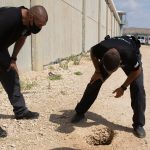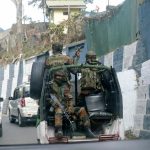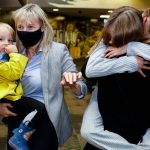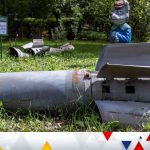The UK has evacuated 2,197 people to safety from war-torn Sudan, making it the longest and largest airlift by any of the Western nations during the crisis, the Foreign Office has said.
As fighting raged on Monday in the capital, Khartoum, the UK government’s airlift came to an end with two final evacuation flights from Port Sudan on the country’s eastern coast.
Attention now turns to diplomatic and humanitarian efforts as civilian casualties continue to rise amid intense fighting.
After fighting broke out on 15 April, British diplomats were quickly evacuated in a special military operation a week later, and the government faced criticism for not evacuating British nationals as well.
After a ceasefire was agreed the RAF flew more than 20 flights and the UK deployed over 1,000 personnel to evacuate British nationals, as well as Sudanese doctors and those of other nationalities who work as clinicians within the NHS, and their dependents, Defence Secretary Ben Wallace said.
In total, the UK has evacuated 1,087 people from other nations, including the US, Ireland, Netherlands, Canada, Germany and Australia.
Those numbers are expected to be updated tomorrow after the final flights land in Cyprus.
Read more:
‘Death will come to you anywhere’ – mayhem at Port Sudan
Traumatised Sudan evacuees describe ‘horrendous’ scenes
Explainer: What’s behind the Sudan fighting?
On Saturday, the UK stopped evacuation flights from an airfield north of the capital, Khartoum, due to what the government said was a “significant decline” in the number of Britons coming forward, and an “increasingly volatile” situation on the ground.
The evacuation operation then moved to Port Sudan where a UK team was set up to provide consular assistance to any remaining British nationals. The Royal Navy ship HMS Lancaster was also deployed to the port to assist in the evacuation efforts.
In a statement, Foreign Secretary James Cleverly hailed the “extraordinary” efforts of the UK evacuation teams, and added: “As the focus turns to humanitarian and diplomatic efforts, we will continue to do all we can to press for a long-term ceasefire and an immediate end to the violence in Sudan.”
Defence Secretary Ben Wallace added that the British armed forces had “led the way” in evacuating nationals.
“In one week, the RAF has flown more than 20 flights, deployed over a thousand personnel, evacuated over 2,000 civilians and helped citizens from more than 20 countries to get home,” he said.
“HMS Lancaster will remain at Port Sudan and her crew will continue to help provide support.”
The attention of UK teams now turns to diplomacy and humanitarian aid.
International Development Minister Andrew Mitchell has spent the weekend in Kenya’s capital, Nairobi, to meet with Kenyan President William Samoei Ruto and African Union Chairperson Moussa Faki Mahamat to discuss the conflict.
Meanwhile, the UK’s ambassador to Sudan – who faced criticism for not being in the country when the fighting broke out – has been deployed to Addis Ababa to work on the UK’s response from the British Embassy in Ethiopia.
The civilian death toll has risen upwards of 411 and the number of injured to more than 2,023, according to the Sudan Doctors’ Syndicate, which measures casualties.
More than 50,000 Sudanese refugees – mostly women and children – have crossed over into Chad, Egypt, South Sudan and the Central African Republic since the crisis began, the United Nations said.
The UK government has urged British nationals who remain in Sudan to continue to follow the government’s travel advice, saying that the situation remains “volatile”.
Consular assistance remains available at Port Sudan, which has become the country’s de-facto administrative capital as fighting rages in Khartoum.






















